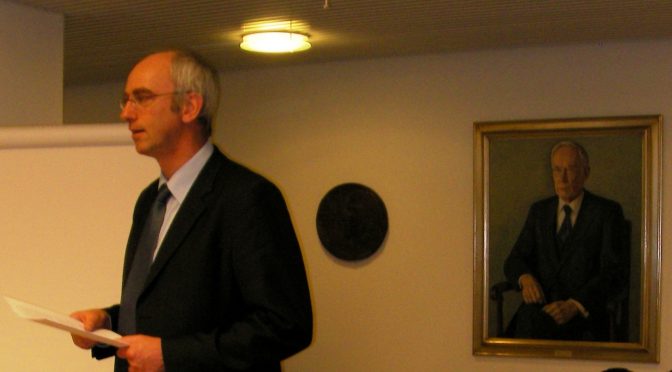More information on programme and registration for the conference can be found here.
Professor Ilmari Soisalon-Soininen (1917–2002) is best known for his research on the syntax of the Septuagint, the ancient Greek translation of the Hebrew Bible. One of the distinct traits of the Septuagint is its nature as a translation from a Semitic language to an Indo-European one. Actually, many of the books included in the Septuagint have different translations whose style and degree of literalism vary greatly. The translators can be characterized by their choice of renderings in such Hebrew structures that can be rendered in many different ways in different contexts. Some of the translators of the Septuagint aimed at rendering a certain Hebrew grammatical structure by a fixed Greek structure as often as possible, sometimes producing unidiomatic Greek or an obscure meaning. Thus the syntax of the translation is partly governed by the source language. Soisalon-Soininen did pioneering work in taking this aspect fully into account by his translation-technical methodology.Nowadays Soisalon-Soininen’s works are referred to in every study of the syntax of the Septuagint. His work is carried on by a growing number of scholars all over the world. This June (1–3) the University of Helsinki has the honour of hosting an international symposium in celebration of Soisalon-Soininen’s 100th birthday. The occasion will bring many of the top experts in the field to Finland:
John A.L. Lee (Macquarie University, Sydney) is a top specialist in Koine Greek, especially the language of the Septuagint, the New Testament, and Greek documentary texts. His major publications include A Lexical Study of the Septuagint Version of the Pentateuch (1983) and A History of New Testament Lexicography (2003). Lee gave the Grinfield Lectures in Oxford 2011–2012.
Silvia Luraghi (University of Pavia) is an expert in ancient Indo-European languages, especially Greek, Hittite and Indo-Aryan. Septuagint scholars know her best for her book On the Meaning of Prepositions and Cases: A Study of the Expression of Semantic Roles in Ancient Greek (2003) which underlines the importance of historical linguistic development in the study of the Greek syntax. Luraghi is one of the two founders and editors of Journal of Historical Linguistics (with Jóhanna Barðdal).
Jan Joosten (University of Oxford) is the author of The Verbal System of Biblical Hebrew: A New Synthesis Elaborated on the Basis of Classical Prose (2012) and the editor of 1 Kings for Hebrew Bible – A Critical Edition. In addition to Hebrew syntax and textual criticism, his expertise extends to Septuagint lexicography. With Eberhard Bons, he edits the forthcoming Historical and Theological Lexicon of the Septuagint. Joosten is the editor-in-chief of Vetus Testamentum.
James K. Aitken (University of Cambridge) has a wide range of research interests from the history of biblical interpretation to the lexicography and semantics of Hebrew, Aramaic, and Greek. His books include The Semantics of Blessing and Cursing in Ancient Hebrew (2007) and No Stone Unturned: Greek Inscriptions and Septuagint Vocabulary (2014). Septuagint scholars are especially grateful to Aitken for editing the invaluable T&T Clark Companion to the Septuagint (2015).
Theo van der Louw (SIL International) is the author of Transformations in the Septuagint: Towards an Interaction of Septuagint Studies and Translation Studies (2007), a ground-breaking study promoting interaction between Septuagint research and Translation Studies. Translational transformations must be categorized linguistically before speculating either with the translator’s ideology or with possible variants in the Hebrew parent text. One translational choice means rejecting another; analysing the reason for rejecting a possible literal rendering reveals the rationale behind a transformation.
The Finnish top experts in the symposium include four former students of Soisalon-Soininen:
Raija Sollamo (University of Helsinki) is an expert in translation technique as well as Qumran studies and the author of Renderings of Hebrew Semiprepositions in the Septuagint (1979) and Repetition of the possessive pronouns in the Septuagint (1995). Anneli Aejmelaeus (University of Helsinki) is among the top textual critics of the Septuagint, the editor of 1 Samuel for the Göttingen Septuagint, and the author of On the Trail of the Septuagint Translators (1993, 2007). Anssi Voitila (University of Eastern Finland) is known as an expert in the syntax of the Greek Pentateuch (Présent et imparfait de l’indicatif dans le Pentateuque Grec, 2001) and for his studies on Ben Sira. Seppo Sipilä (Finnish Bible Society) is the author of Between Literalness and Freedom: Translation Technique in the Septuagint of Joshua and Judges (1999) and the editor of Joshua for the Biblia Hebraica Quinta project.

